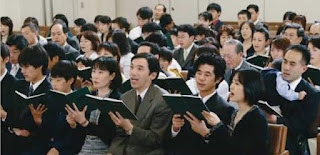
There are many times during sacrament meeting when a hymn I know begins, and instead of pulling out my hymnbook, I sing from memory, holding a baby with one hand while I stop two of my other children from fighting with the other. I sing without thinking--I've sung the hymn so many times, it's become easy for my brain to focus on other things while my lips form the words.
A New Experience Every Time

How many organists, in choosing the registration for any given Sunday, pick the same preset every single week? Prelude is always #1. The opening hymn is always preset #6, the sacrament hymn is always #3, and the closing hymn cycles between #3 and #6? How effective is this approach?
What is the weekly hymn singing experience for this congregation? What is the weekly hymn singing experience for your congregation?
Something I learned recently is that we need to make singing the hymns a new experience for our congregation every single Sunday--a new experience every single time they sing a hymn.
This new experience can be something as simple as varying the registrations each week, and/or changing registrations on certain verses. Instead of using the same registration for every sacrament hymn, one week use just a principal 8' and 4'; another week use a principal 8' with a flute 8' and 4' (maybe even adding a 2' flute for the final verse); another week use a principal 8' and strings or gemshorn, maybe with a flute or two); and so on...
On a familiar hymn, you could try playing all of the voices on one manual the second-to-last verse, then add the pedal back on the final verse (remove the bass coupler for one verse, then add it back for the last if you don't play pedals). Or, you can alter the introduction, which I'll be teaching in the next few lessons, so that members feel excited to sing a hymn that they've sung hundreds of times before.
Another method is to solo the soprano or tenor on one manual while playing the other voices on a slightly softer manual, with the bass in the pedal. On an unfamiliar hymn, soloing the soprano on the first verse helps the congregation better hear and sing the melody. On a hymn with a beautiful tenor line, soloing the tenor up an octave on the second or third verse adds melodic interest without diverting from the written harmonies in the hymn.
Add a pedal point for part of a hymn while playing all four voices on one manual. Some hymns, such as Joy to the World, have a pedal point already written in, which adds a nice depth to the hymn.
At times, change keys up or down a half- or whole-step for the final verse (ensuring that the notes stay within the comfortable singing range of each voice). This may necessitate beginning the hymn in a different key than in the hymnbook, and ensuring the congregation will hear and recognize the new key before beginning to sing.
On occasion, and only on occasion, use a free accompaniment on the final verse of a familiar hymn, announcing ahead of time for all members to sing the final verse in unison.
Seek the Spirit, and humbly strive to make each hymn you play a new singing experience for your congregation.
Don't Go Overboard

Be careful, however, that you don't draw undue attention to yourself, or detract from the hymn itself. Everything you do as organist should be to share the message of the hymns more fully with your congregation. Nothing should be showy or unnecessarily elaborate. If you do your job correctly, most members of the congregation won't even know that you did anything out of the ordinary--they'll just feel more excited to sing, or will feel the Spirit more strongly during the hymns. This is the desired outcome.
If you ever have the slightest doubt about whether or not something is appropriate, or if you're not sure it is the best way to go, DON'T DO IT! That little bit of doubt is the Spirit telling you the answer is, "No!"
Begin Slowly

Don't immediately rush in and start playing a free accompaniment every week! Make a small change here and there, always evaluating whether or not it was effective, if the congregation responded favorably or not, and what you could have done to better share the Spirit of each hymn.
Take special care with the sacrament hymn. I, personally, don't feel a free accompaniment is ever appropriate for this hymn, and I believe great care should be taken during this hymn to make sure the congregation remains focused on the sacrifice of the Savior and the symbols of the sacrament.
Before choosing to use a free accompaniment, clear it with your Priesthood leaders, and only use one if they are okay with it.
Line Upon Line

Remember: "Line upon line; here a little, and there a little." Begin slowly, listen to and follow the Spirit, and always strive to enhance the spirit of the hymn as you accompany your congregation. Never draw attention to yourself.
"Sing praises to God, sing praises:
sing praises unto our King, sing praises.
For God is the King of all the earth:
sing ye praises with understanding."
Psalms 47:6-7.
sing praises unto our King, sing praises.
For God is the King of all the earth:
sing ye praises with understanding."
Psalms 47:6-7.




No comments:
Post a Comment